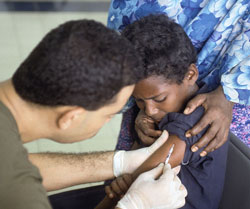
Top stories

Marketing & MediaCould an alcohol ad encourage children to climb into washing machines?
Karabo Ledwaba 5 hours

Energy & Mining#MiningIndaba: Is South African mining ready for the skills of tomorrow?
Maroefah Smith 6 hours




More news















Major findings include a majority of physicians think that parents' level of concern about vaccines has either greatly or moderately increased in the past five years and that they are spending a significant amount of time at well child visits discussing vaccine safety with parents. Relying only on discussion of vaccines at visits where vaccines are needed may be too time-consuming and inadequate and may compromise providers' ability to focus on other important health care topics.
The study, Prevalence of Parental Concerns about Childhood Vaccines: The Experience of Primary Care Physicians, to be published in the May issue of American Journal of Preventive Medicine and online 15 April.
According to the study results, in a typical month, 79% of physicians report at least one vaccine refusal; 8% report refusals for more than 10% of children. In addition, 89% report at least one request to spread out vaccines - 20% report these requests for more than 10% of children.
Other study findings include the following:
Primary care providers in this country have been doing a terrific job trying to counter the misinformation about vaccine safety that is so abundant on the internet and other media, but they are spending a great deal of their time at well visits discussing these issues alone," said Kempe. "The amount of time physicians have in a well child care visit to cover a lot of health care topics is very limited and they are not being paid for the lengthy discussions some parents with concerns need to have. Most importantly, they may have to compromise other health care topics if these discussions are long. Clearly, primary care physicians would benefit from a multi-pronged approach, with greater use of educational methods before visits or different educational forums such as group visits and much more effective use of media and social marketing to counter misinformation."
Kempe believes the multi-pronged approach should include the following:
Kempe is also the 2011 winner of the Academic Paediatric Association Research award. The award recognises the highest level of research excellence and achievement in the field of general paediatrics. Kempe's research has led to improved child health policies in health disparities among underserved populations, state Children's Health Insurance Programs funding, and immunisation delivery, policies and practices. She will receive her award during the Paediatric Academic Societies' 2011 Annual Meeting in Denver on 1 May.
Faculty at the University of Colorado School of Medicine work to advance science and improve care. These faculty members include physicians, educators and scientists at University of Colorado Hospital, The Children's Hospital, Denver Health, National Jewish Health, and the Denver Veterans Affairs Medical Centre. Degrees offered by the CU School of Medicine include doctor of medicine, doctor of physical therapy, and masters of physician assistant studies. The School is located on the University of Colorado's Anschutz Medical Campus, one of four campuses in the University of Colorado system.
Source: University of Colorado Denver